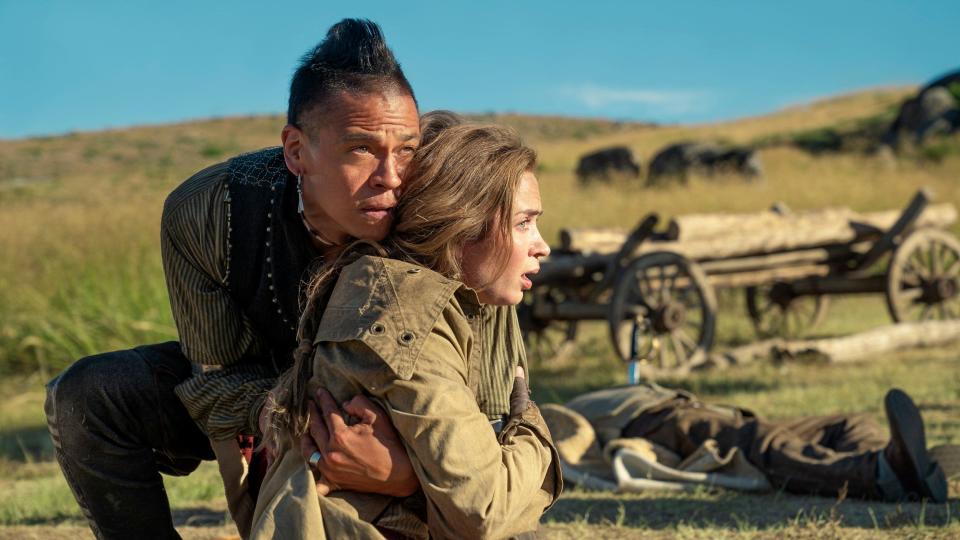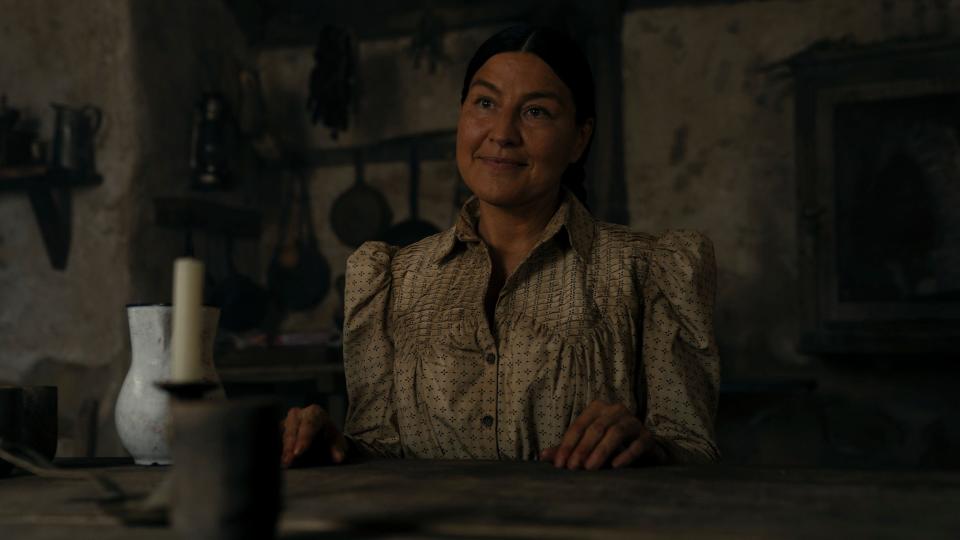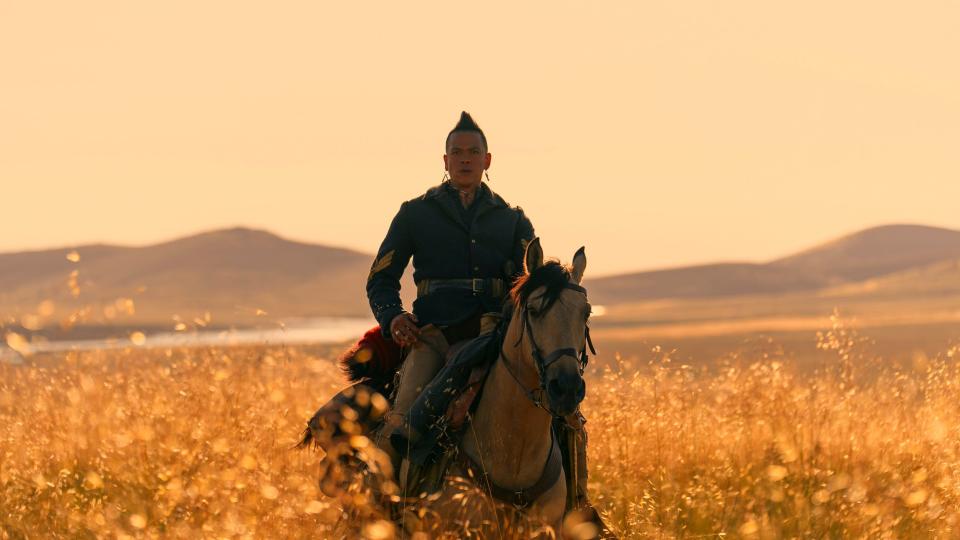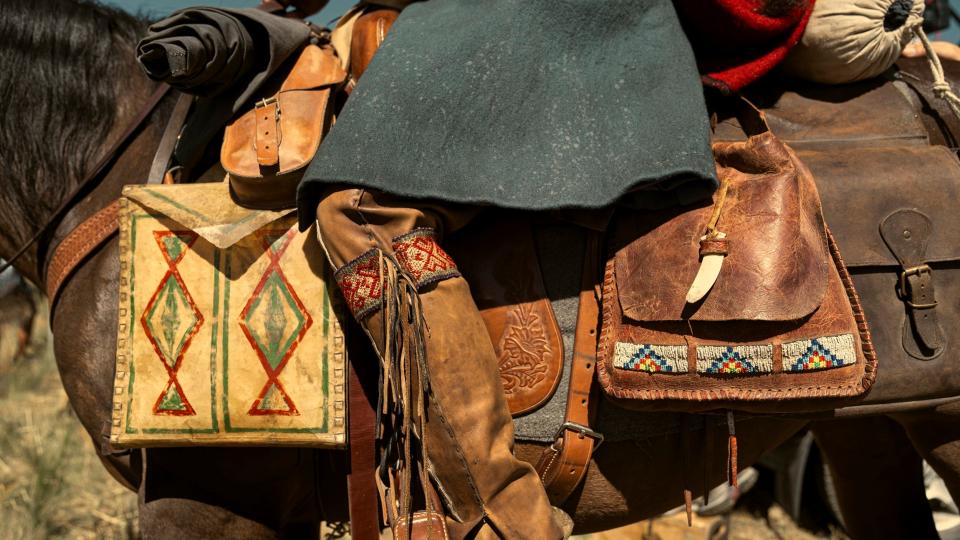In Emily Blunt's 'The English,' Pawnee advisers enjoy hero's role
Over the past three decades, Kevin Costner's 1990 film "Dances With Wolves" has been credited with marking a pivotal turning point in how Native American characters were portrayed in mainstream movies.
For members of the Pawnee Nation of Oklahoma, though, the legacy of the seven-time Oscar-winning film hasn't been as favorable.
"Too many times, I've been confronted by people that their only exposure to Pawnee culture, Pawnee people, is through a film from the '90s that we all know, where we were the villains. So, they based all of their information off of that — and we were never consulted on that," said Matt Reed, the Pawnee Nation's tribal historic preservation officer.
But Reed and three fellow Pawnee tribal members — Maggie Cunningham, Taylor Moore and Zach Rice — consulted on the language, music, clothing and other Pawnee cultural details for "The English," a sweeping new Western series streaming on Amazon Prime Video.
Written and directed by award-winning British filmmaker and actor Hugo Blick ("The Honourable Woman"), the twisty saga follows British movie star Emily Blunt ("A Quiet Place," "Mary Poppins Returns," the upcoming "Pain Hustlers") as Lady Cornelia Locke, an English aristocrat who treks to the newly established Oklahoma Territory (formerly Indian Territory) in 1890 on a quest to kill the man she holds responsible for the death of her child.
She joins forces with Eli Whipp, a former Union Army cavalry scout from the Pawnee Nation who is heading to Nebraska in the hopes of claiming a homestead, played by Tahlequah-born actor Chaske Spencer (“The Twilight Saga," "Wild Indian," the upcoming Marvel series "Echo"), who is Lakota Sioux, Nez Perce, Cherokee and Creek.
"This is probably the first time that the Pawnees are going to be the hero in a film. Usually we're the villains, and it's a very stereotypical portrayal. You always have to have the villain in a production, and just by default, we're the ones," Reed told The Oklahoman in a November Zoom call from New York City, where he was getting ready to attend "The English" premiere with his fellow Pawnee consultants.
"We have our stories, our songs, our oral history, (and) that talks about an alternative version of what is being presented to the general public. So, our heroes are Pawnee: This is the first time, I think, that's going to be presented, where the hero of a film is Pawnee. So, in the back of my mind, I hope that really influences our kids and our community."

'The English' creators go beyond 'rubber-stamping' to ensure accuracy
In a six-episode series full of surprising narrative twists and suspenseful action sequences, Cunningham got her first thrill less than two minutes into the first episode: In Blunt's opening voiceover, "The English" star speaks a Pawnee word that's translated on the screen as "I cherish you."
"It's very exciting for me — and I thought she spoke very well," Cunningham said via Zoom from New York. "It's not easy to expect someone who has no exposure to your language or your culture to be able to just speak it. I think that's absolutely a credit ... to her as an actor. I'm thrilled."
The idea for "The English" dates back to Blick's teenage years, when he was sent from England to Montana to live with a family friend. A U.S. Air Force colonel, Olympic gold medalist in rowing and passionate outdoorsman, that friend provided Blick with his first exposure to Native American communities.
"For me the most interesting Westerns tend to explore the themes of personal loss and consequent restoration of justice. Perhaps what’s unusual about 'The English' is who it chooses for its heroes, a Native American man and an Englishwoman, and the precise kind of justice they’re both looking to restore," Blick said in a statement.
When he wrote "The English," Blick sent each script to Crystal Echo Hawk, an enrolled member of the Pawnee Nation of Oklahoma and the CEO of the Native advocacy organization IllumiNative. She helped him connect with representatives of the Pawnee and Cheyenne nations who are experts in their tribes' cultural and military history.
"I really felt that our input shaped a lot of the things that you see and that you'll be hearing on the screen," said Cunningham, an Emmy-winning Tulsa-based producer and senior production manager for the Cherokee Nation's OsiyoTV.
"It was never a lot of what I call rubber-stamping: They didn't come in completely ready and they wanted to an OK, and we would just say, 'Great, this looks good.' From the moment we were involved with the project, they really let us guide how things should look ... and they would absolutely be open to any feedback that we had."

Pawnee advisers consulted with tribal elders to achieve authenticity
Although filming took place in Spain during the COVID-19 pandemic, Cunningham said "The English" team still made accuracy a priority, collaborating remotely with the Pawnee advisers.
"Being based in different time zones, there was a lot of us working on different schedules. But I never felt that they didn't want to get it right. ... Hugo was very not only eager, but he was adamant that he wanted things to be accurate. If that meant that language translations took longer ... they were always patient, because it meant that it was going to be accurate," she said.
"It takes time to work with elders, it takes time to do some of these things ... and I felt that they were very, very good with that."
When he saw the first photos of Spencer dressed as his Pawnee character, Reed said he was shocked at how much the actor looked like a historical photograph.
"There were little, subtle things in there that I know I talked about with the production company, and he would have it on him. So, I was surprised. I'm used to that most of the time people ignore historians, so that was a cool thing to see," Reed said with a chuckle.
"It was surprising that when I said, 'Well, he wouldn't do that,' or 'He wouldn't have this,' that they actually listened. ... I hope that this is the beginning of more experiences that are like that, that we can show that when you include tribes in productions of things that it can lead to a good product in the end."

Pawnee leading man's fictional storyline reflects real-life events
In "Dances with Wolves," the main antagonist — memorably played by Oscar-honored Cherokee actor and Oklahoma native Wes Studi — doesn't even have a proper name. He is known as "Toughest Pawnee."
In "The English," Spencer's Eli Whipp is a leading man and love interest with a complex backstory: As a cavalry officer, he's treated scornfully by many fellow soldiers and Natives alike. As a veteran of the Union Army, he's entitled to special treatment under the Homestead Act, and he's determined to claim some of his tribe's stolen land for his own — even as he recognizes that prejudice will make it difficult, if not impossible, for him to succeed.
"It doesn't fit what you've seen in past movies: It's not some kind of stereotype where we have to be mean and angry all the time and all we do is just scowl at people. We're multifaceted," Reed said.
"While it is a fictional character, it is a fictional storyline, it's based on things that actually did happen."

For Cunningham, part of the appeal of "The English" is that it shows that Natives can exist in an entertaining fictional drama — and that producers can and should still strive to portray those characters accurately in the process.
"We always want a good story. But I think when things aren't accurate, when things are portrayed without an authentic voice, it's easy to push these stories aside — and it's hard to be proud of them. I think, as Native people, it's hard to be proud of these projects when there's things that just weren't right from the beginning," she said.
"I'm really excited for everyone to see this ... but I really can't wait for everyone to see it in Pawnee."
This article originally appeared on Oklahoman: Pawnee Nation of Oklahoma members were advisers on 'The English'
